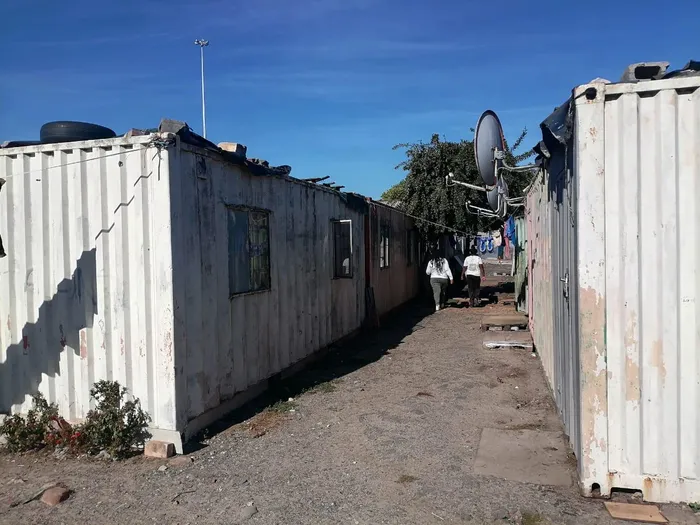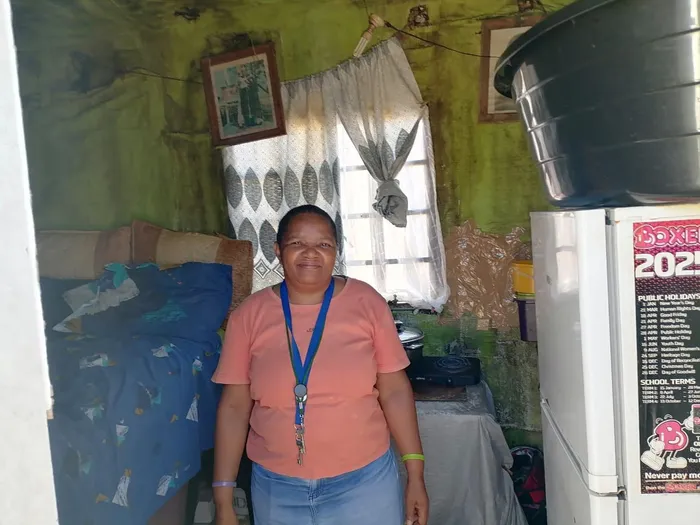Langa residents demand a decent place to live
re containers
When one drives around the vibrant streets of Langa, it’s not uncommon to see white containers dotting the landscape. At first glance, these containers resemble those used for rubbish disposal, a sight all too familiar in many townships. However, a deeper inspection reveals a heartbreaking reality: these six-metre containers have been transformed into makeshift homes for families clinging to a glimmer of hope amidst abject conditions. In a community bursting at the seams, one container often accommodates two families, leaving little more than a cramped space for living.
Nomsa Lawu, a 52-year-old mother of three, provides a glimpse into these harsh living situations. “There are 32 families living in these containers,” she explains, her voice heavy with the burden of their collective plight. “The conditions are becoming worse every day.” Inside the containers, she notes that a three-quarter bed consumes most of the space, leaving room only for a small fridge and an electric stove. Anything else is a luxury none can afford. Privacy, she asserts, is non-existent. The thin ceiling board that separates her family from their neighbours only amplifies the sound of life’s most intimate moments. “We do not know what privacy is,” she laments. “During the night, we have to use buckets to relieve ourselves and fear for our safety while doing so.”
These containers were initially intended as a temporary relocation solution for Langa’s residents over 23 years ago, paving the way for a housing development that never materialised. Lawu shares that the government’s promises seem to vanish into thin air. With no access to clean water or proper sanitation, residents often seek the goodwill of nearby households to use their facilities. “Sometimes we have to beg just for the simplest needs,” she continues. “In winter, these containers leak, and in summer, they become unbearably hot.”

These are the containers converted into houses and not only that but a container is divided into two so that two famailies could occupy them.
Image: SIyavuya Khaya
Despite the uncomfortable conditions, Lawu’s spirit remains unbroken, her resilience echoed by fellow residents like Phumeza Qutyelo, 43, who longs for the day they can leave the containers behind. “If I had the means, I would have moved a long time ago,” she expresses, a plea for immediate assistance falling from her lips. “We need access to electricity and toilets while we wait for proper housing.”
The City of Cape Town remains aware of the residents' plight. Carl Pophaim, a mayoral committee member for human settlements, acknowledged in a recent statement that the conditions within these temporary accommodation units – provided in 2002 – have become untenable. He stated, “We fully understand the frustration caused by the delays in relocation and upgrades,” and added that funding is now available for necessary improvements at the site.
This new initiative promises upgraded Temporary Relocation Area (TRA) structures for qualifying households, including access to communal water and sanitation – addressing long-standing issues of basic service shortages. While these upgrades will still classify as temporary, they mark a critical step toward improved living conditions for families trapped in this cycle of unfulfilled promises.
Ward councillor Lwazi Pakade reassured residents that he has been actively engaging the city for more effective solutions. He plans to address the community to discuss these latest developments and hope for what lies ahead. Their resilience glimmers amid the struggle, but the demand for action remains urgent.
As Langa's microcosm of struggle unfolds, the stories of its residents serve as a reminder of the resilience needed in the face of persistent adversity. The call for basic dignity, security, and a place to truly call home resonates deeply within each container.

Resident Nomsa Lawu said she has been living on this three metre converted container for more than 20 years with the hope that one day she would be moved to a decent house.
Image: Siyavuya Khaya